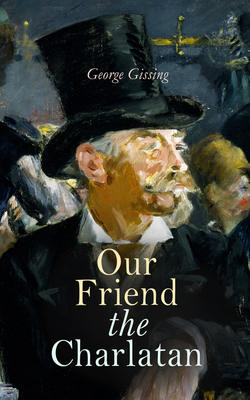Читать книгу Our Friend the Charlatan - George Gissing - Страница 12
На сайте Литреса книга снята с продажи.
CHAPTER VIII
ОглавлениеTable of Contents
Under the roof at Rivenoak was an attic which no one ever entered. The last person who had done so was Sir Quentin Ogram; on a certain day in eighteen hundred and—something, the baronet locked the door and put key into his pocket, and during the more than forty years since elapsed the room had remained shut. It guarded neither treasure nor dire secret; the hidden contents were merely certain essays in the art of sculpture, sundry shapes in clay and in marble, the work of Sir Quentin himself when a very young man. Only one of these efforts had an abiding interest; it was a marble bust representing a girl, or young woman, of remarkable beauty, the head proudly poised, the eyes disdainfully direct, on the lips a smile which seemed to challenge the world's opinion. Not a refined or nobly suggestive face, but stamped with character, alive with vehement self-consciousness; a face to admire at a distance, not without misgiving as one pictured the flesh and blood original. Young Quentin had made a fine portrait. The model was his mistress, and, soon after the bust was finished, she became his wife.
Naturally, Sir Spencer and Lady Ogram were not bidden to the wedding; in fact, they knew nothing about it until a couple of years after, when, on the birth to him of a son and heir, Quentin took his courage in both hands and went down to Rivenoak to make the confession. He avowed somewhat less than the truth, finding it quite task enough to mitigate the circumstances of Mrs. Ogram's birth and breeding. The exhibition of a portrait paved his way. This superbly handsome creature, adorned as became her present and prospective station, assuredly gave no shock at the first glance. By some freak of fate she had for parents a plumber and a washerwoman—"poor but very honest people," was Quentin's periphrase; their poverty of late considerably relieved by the thoughtful son-in-law, and their honesty perhaps fortified at the same time. Arabella (the beauty's baptismal name) unfortunately had two brothers; sisters, most happily, none. The brothers, however, were of a roaming disposition, and probably would tend to a colonial life; Quentin had counselled it, with persuasions which touched their sense of the fitting. So here was the case stated; Sir Spencer and his lady had but to reflect upon it, with what private conjectures might chance to enter their minds. Quentin was an only child; he had provided already for the continuance of the house; being of mild disposition, the baronet bowed his head to destiny, and, after a moderate interval, Arabella crossed the threshold of Rivenoak.
Of course there were one or two friends of Quentin's who knew all the facts of the case; these comrades he saw no more, having promised his wife never again to acknowledge or hold any intercourse with them. With his bachelor life had ended the artistic aspirations to which he had been wont to declare that he should for ever devote himself; Mrs. Ogram (she had been for a year or two a professional model) objected to that ungentlemanly pursuit with much more vigour and efficacy than the young man's parents, who had merely regretted that Quentin should waste his time and associate with a class of persons not regarded as worthy of much respect. Whether the dismissed cronies would talk or keep silence, who could say? Sir Spencer affected to believe that Arabella, when his son came to know her, was leading the life of a harmless, necessary sempstress, and that only by long entreaty, and under every condition of decorum, had she been induced to sit for her bust to the enthusiastic sculptor. Very touching was the story of how, when the artist became adorer and offered marriage, dear Arabella would not hear of such a thing; how, when her heart began to soften, she one day burst into tears and implored Mr. Ogram to prove his love, not by wildly impossible sacrifice, but simply by sending her to school, so that she might make herself less unworthy to think of him with pathetic devotion, and from a great distance, to the end of her days. To school, in very deed, she had been sent; that is to say, she had all manner of teachers, first in England and then abroad, during the couple of years before the birth of her child; and by this instruction Arabella profited so notably that her language made no glaring contrast with that of the civilised world, and her mind seemed if anything more acute, more circumspective, than women's generally in the sphere to which she was now admitted. Sir Spencer and Lady Ogram did not love her; they made no pretence of doing so; and it may be feared that the lives of both were shortened by chagrin and humiliation. At the age of thirty or so, Quentin succeeded to the baronetcy. In the same year his son died. No other offspring had blessed, or was to bless, the romantic union.
